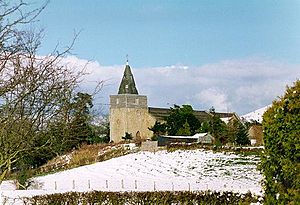St Nicholas Church, Churchstoke facts for kids
Quick facts for kids St Nicholas Church |
|
|---|---|
| Church of St Nicholas | |
 |
|
| Location | Churchstoke, Montgomeryshire, Powys SY15 6AF, Wales |
| Denomination | Church of England |
| Previous denomination | Roman Catholic |
| History | |
| Former name(s) | St Mary's Church |
| Status | active |
| Architecture | |
| Heritage designation | Grade II |
| Designated | 1953 |
| Administration | |
| Parish | Churchstoke |
| Diocese | Diocese of Hereford |
St Nicholas's Church is a historic church in Churchstoke, Powys, Wales. It belongs to the Church of England. Before 1881, it was known as St Mary's Church.
Most of the church building you see today was rebuilt in the 1800s. However, it still has its original tower from the 1200s. This old tower even has a wooden bell tower added later. Only a few items like a font, a holy water basin (stoup), and a chest remain from before the 1800s. The main part of the church, with its tall roof, was built in the mid-1800s. The church is recognized as a Grade II listed building, meaning it's an important historical site.
Contents
The Church's Long History
The way the churchyard is shaped and its spot near the River Camlad suggest that a church has been here since the early Middle Ages. In 1881, the inside of the church was arranged as it is now. It was also renamed and dedicated to Saint Nicholas. A church clock was put in place in 1887. This was to celebrate Queen Victoria's 60 years as queen.
The Tower and Its Role in Battles
The church has a square tower at its western end. This tower was built in the 1200s. In 1812, it was made a bit shorter. A special wooden bell tower, typical for Montgomeryshire, was added on top. Its pyramid-shaped roof was covered with new oak roof shingles in 2005.
The tower was once used as a safe place during fights in the 1300s. Later, it played a part in the English Civil War. In 1646, soldiers loyal to Parliament attacked a group of Royalist soldiers. The Royalists were planning to stay overnight in Churchstoke. They quickly took shelter inside the church. During the fight, the Parliamentarians set the church door on fire. This forced the Royalists to give up.
Rebuilding and Changes Over Time
In 1751, the church's south wall was taken down. A new section, called a south aisle, was built. Then, in 1812, the old church building was mostly removed. A new main hall, or nave, was constructed. Stones for this came from Churchstoke Hall and local quarries. The roof was made of slate from Corndon Hill. This new building also included a schoolroom and galleries (upper seating areas).
The iron columns you see inside today were made in Coalbrookdale. They likely supported the old galleries. These columns have octagonal stone bases and decorative square tops. They now hold up the church's lower roof. In 1881, the north and south walls of the chancel (the area around the altar) were rebuilt. A new south porch was also added. The aisles are separated from the nave by a series of six arches. Above these arches is a decorative wooden border.
The chancel is thought to have been added in 1867. It is narrower than the main nave. The floor in the chancel and the sanctuary (the holiest part) is covered with colorful tiles. A tiled screen behind the altar, called a reredos, has recently been uncovered. There is a special basin, called a piscina, in the chancel's south wall. There are also three brass plaques from the 1800s, likely added in 1867.
The south transept (a part of the church that sticks out like an arm) holds the organ. The north transept is the choir vestry (a room for clergy and choir). The boiler room is underneath it. Even after all the repairs, you can still see bullet holes from the Civil War. These are especially noticeable on the underside of an upper window on the tower's north wall.
St Nicholas Church was given its Grade II listed status in 1953. This means it's considered very important historically. It shows how the church was rebuilt many times, keeping parts from each period. This includes the old medieval tower, work from the early 1800s, and changes made in 1867.
A Local Legend
There's a local story about the church in the nearby village of Hyssington. The legend says a tiny bull is buried under the church step. It's believed this bull caused a lot of trouble in the area. Twelve priests had to perform a special ceremony, called an exorcism, to make it leave.
A Special Vote for the Church
In 1914, the Parliament of the United Kingdom passed a law called the Welsh Church Act 1914. This law was meant to separate the Church in Wales from the Church of England. However, the law was delayed. Because of this, seventeen parishes, including Churchstoke, had a special vote in 1915.
This vote was to decide if they wanted to join the new Church in Wales or stay with the Church of England. These parishes were special because their church boundaries crossed the England-Wales border. The people of St Nicholas Church voted 390 to 75 to remain part of the Church of England. This happened even though the church building is located in Wales. Because of this vote, St Nicholas Church is still part of the Diocese of Hereford.
See also
 | Claudette Colvin |
 | Myrlie Evers-Williams |
 | Alberta Odell Jones |

